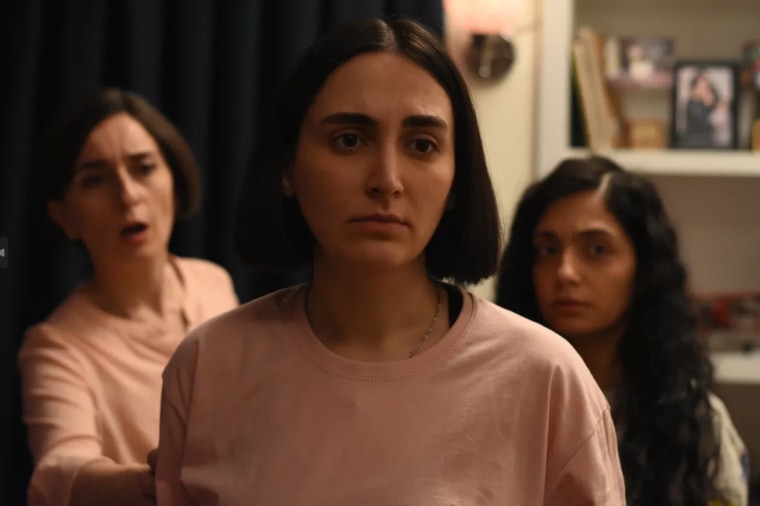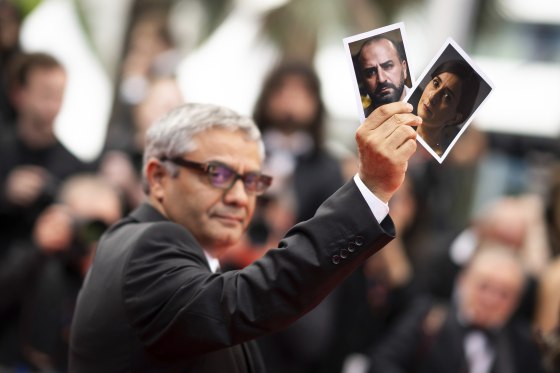Iranian director Mohammad Rasoulof learned he had been sentenced to eight years in prison while he was completing his latest film, the tense political thriller “The Seed of the Sacred Fig.” Rasoulof, a fierce critic of Iran’s theocratic regime, faced a stark choice: try to flee the country or face severe punishment.
“I would not only lose this very active, fertile period for filmmaking. I would also be transformed into somebody who has to play the role of the sacrificed artist, the victim of censorship,” Rasoulof said through an interpreter in a Zoom interview from New York.
It was a role he refused to play.
Rasoulof furtively escaped Iran on foot and, after a treacherous journey, took refuge in Germany. He now lives in exile in Europe, far from a government that planned to lock him up because he publicly opposes the socially repressive Islamic Republic, which has ruled Iran with an iron fist since the revolution against the shah in 1979. Rasoulof can travel through the West — and so can the film he made in virtual secrecy.
“The Seed of the Sacred Fig,” which debuted in American theaters on Wednesday, centers on a middle-aged man named Iman, an investigator for the Revolutionary Court who lives in Tehran with his devoted wife and their children. When the film begins, Iman is tasked with rubber-stamping harsh sentences for protesters rallying in the streets against the authoritarian state. It’s a mandate that unsettles his conscience and puts him at odds with his two liberal-minded daughters. When his work-issued gun goes missing, Iman spirals into paranoia and rage.
Rasoulof conceived the film after serving a prison term in 2022, a period that coincided with popular uprisings in Iran following the death in police custody of Mahsa Amini, a 22-year-old Iranian Kurdish woman who was arrested for allegedly not wearing a hijab. In writing the screenplay, Rasoulof drew on a “chance encounter” in prison with a senior official who confessed that he was “deeply mortified and embarrassed” by his job and contemplating suicide.
“I had a number of ideas relating to the psychology of people like Iman, people who work for the regime in Iran — those who interrogated me, those who repress artists through the censorship apparatus,” Rasoulof said. “I wondered: Who are they? How do they think? How does their psychology work? Why can I not think like them?”
Iran’s Islamic Republic has long been intent on squashing dissent from activists and artists. In recent years, authorities have repeatedly arrested Rasoulof and attempted to restrict his travel as apparent punishment for his films and statements criticizing state-backed violence, including a letter he co-signed opposing the government’s response to protests over a 2022 building collapse that killed dozens of people. Officials confiscated his passport in 2017.
Early this year, during the production of “Sacred Fig,” Rasoulof was sentenced to prison as well as flogging, a fine and confiscation of his property on the charge of “propaganda activities against the Islamic Republic of Iran,” according to his lawyer, Babak Paknia, who lives in Tehran and confirmed the details of the case to NBC News. Iran’s mission to the United Nations did not respond to an email seeking comment.
“The Seed of the Sacred Fig” is fiction, but at times it resembles a documentary about recent political turmoil. Rasoulof incorporates actual cellphone footage of the “Woman, Life, Freedom” activism that swept the nation that year. Iman’s daughters, a watchful 20-something and a free-spirited teenager, view social media clips of demonstrators marching in the streets as well as graphic videos of the brutal police crackdown that followed.
Rasoulof and his creative collaborators made the film clandestinely, with the cast and crew fearing arrest, he said. Rasoulof and his technicians used minimal equipment and only a handful of shooting locations, insistent on evading the strict censorship system. The paranoia at the heart of the “Sacred Fig” storyline sometimes mirrored the atmosphere on set, where the arrival of a stranger could spell doom for the filmmakers.
“It was inescapable. It’s only natural to be afraid when you’re filming that way,” Rasoulof said.
Rasoulof received the initial notice about his prison sentence four weeks after shooting began. He chose to continue filming while his lawyers filed an appeal. The court system ultimately rejected that appeal and reaffirmed his penalties around the time filming concluded, according to his lawyer. Rasoulof needed to decide on his next move. He had the phone number of a person he met in prison who had offered to help him flee Iran, if it ever came to that. He made the call.
“I had to take a new path, he said. “I abandoned my electronics and equipment, packed a small bag with just a few clothes, and left.”
Rasoulof cannot go into great detail. “It was a really dangerous and horrible journey,” involving “a lot of walking” through perilous undisclosed territory, he said. Twenty-eight days after he set out, Rasoulof found a safe harbor at the consulate in Germany and obtained documents that allowed him to move with relative ease in Europe. He announced the news of his escape on Instagram, sharing a video of snow-capped mountains.
Two weeks after Rasoulof’s daring exit, on May 24, “Sacred Fig” premiered at the 77th Cannes Film Festival — in the face of intense resistance from Iranian authorities. Rasoulof, walking the Cannes red carpet, displayed photos of lead actors Missagh Zareh and Soheila Golestani, who have faced pressure from the courts in Iran, according to the director.
The film received a 12-minute standing ovation, won the Special Jury Prize and earned Rasoulof some of the best reviews of his already acclaimed career.
“Sacred Fig” is now Germany’s entry for best international feature at the 97th Academy Awards in early March.

The film arrives in select theaters in New York and Los Angeles courtesy of Neon, the distributor behind recent art-house favorites such as “Anora,” “Triangle of Sadness,” “Anatomy of a Fall” and “Parasite.” Rasoulof said he hopes American viewers who seek out his latest project come away with a more complete, less blinkered idea of contemporary Iran beyond what they might hear from Washington politicians.
“I’d like them to take away the notion — the truth, the reality — that Iran and the Islamic Republic are not the same,” Rasoulof said. “In no way does the Islamic Republic represent the Iranian people or Iranian culture. It’s a minority that has not only occupied but also taken hostage a whole country and a whole people.”
“Iranian people do not want this to continue. Iranian women, throughout their long struggle for freedom — which began a long time ago and which shall continue — are trying in every way they can to change the situation,” he added. “The young generation of Iran really wants peaceful and positive relations with the rest of the world. They want to be a part of the global community.”

